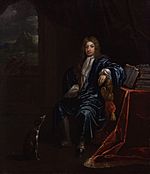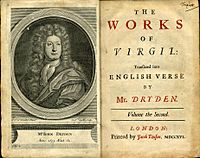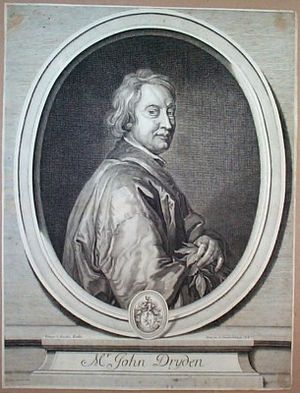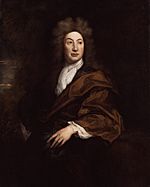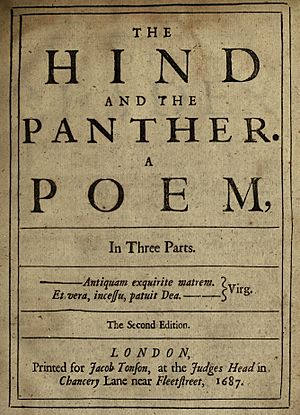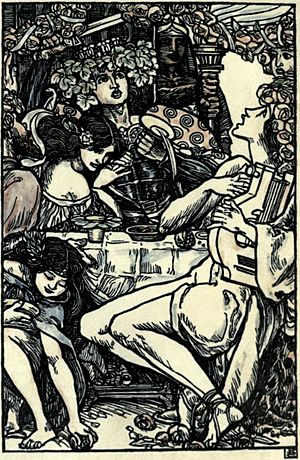John Dryden facts for kids
Quick facts for kids
John Dryden
|
|
|---|---|
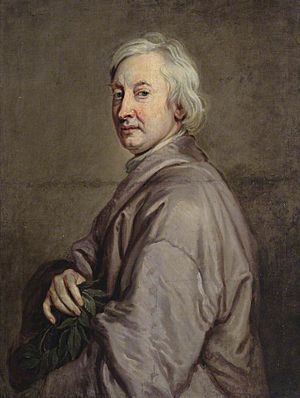 |
|
| Poet Laureate of England | |
| In office 13 April 1668 – January 1688 |
|
| Monarch | Charles II |
| Preceded by | Inaugural holder |
| Succeeded by | Thomas Shadwell |
| Personal details | |
| Born | 19 August 1631 Aldwincle, Northamptonshire, England |
| Died | 12 May 1700 (aged 68) London, England |
| Spouse | Lady Elizabeth Howard |
| Children | Charles, John, and Erasmus Henry |
| Alma mater | Westminster School Trinity College, Cambridge |
| Occupation |
|
John Dryden (born August 19, 1631 – died May 12, 1700) was a famous English poet, writer, and playwright. In 1668, he became England's very first Poet Laureate. This important job meant he was the official poet for the King.
Many people think he was the most important writer during a time called the Restoration period in England. This era is sometimes even called the "Age of Dryden" because of his huge influence. A famous writer named Sir Walter Scott called him "Glorious John."
Contents
Early Life and Education
Dryden was born in a small village called Aldwincle in Northamptonshire, England. He was the oldest of fourteen children. His family were landowners who supported the Parliament and a religious group called the Puritans.
As a boy, John likely started his education in the nearby village of Titchmarsh. In 1644, he went to Westminster School in London. This was a very good school, and his headmaster, Dr. Richard Busby, was a strict but inspiring teacher.
Learning at Westminster School
Westminster School taught students how to debate and present arguments. This skill helped Dryden a lot in his later writing. He also learned to translate texts, which was important for his future work.
During his time there, a major event happened: King Charles I was executed in 1649. Dryden wrote his first published poem about a schoolmate's death. This poem also mentioned the King's execution, showing his royalist feelings.
In 1650, Dryden went to Trinity College, Cambridge. He studied classics, public speaking, and math. He graduated in 1654, at the top of his class for Trinity. After his father died that same year, Dryden had some land, but not enough money to live on.
Starting His Career in London
Dryden moved back to London and worked for Oliver Cromwell's government. Cromwell was the leader of England at the time. Dryden even walked in Cromwell's funeral procession in 1658.
Soon after, he published an important poem called Heroic Stanzas (1659). This poem praised Cromwell. However, when the monarchy returned in 1660 with King Charles II, Dryden quickly wrote a new poem, Astraea Redux. This poem celebrated the King's return and described the time before as chaotic.
Becoming a Famous Writer
After King Charles II came back to power, Dryden became a leading poet and writer. He wrote more poems praising the new King and government. These poems helped him become known.
He hoped to find a rich supporter, but he ended up making a living by writing for publishers. This meant he wrote for the general public who bought books. His poems often celebrated public events, as was expected of a Poet Laureate. In 1662, he joined the Royal Society, a group for scientists, but he wasn't very active.
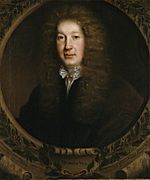
On December 1, 1663, Dryden married Lady Elizabeth Howard. She was the sister of a royalist writer. They had three sons: Charles, John, and Erasmus Henry.
Writing for the Stage
When theaters reopened in 1660 after being closed by the Puritans, Dryden started writing plays. His first play, The Wild Gallant, came out in 1663. It wasn't a big hit, but it showed promise.
From 1668, he had a contract to write three plays a year for the King's Company. Playwriting became his main way to earn money. He wrote popular comedies, like Marriage à la Mode (1673). He also wrote serious plays, and his most successful was All for Love (1678).
Dryden wasn't always happy with his plays. He felt his talent was better suited for poetry. In 1667, he published Annus Mirabilis, a long poem about England's victory over the Dutch and the Great Fire of London in 1666. This poem made him the top poet of his time. It helped him get the jobs of Poet Laureate in 1668 and royal historian in 1670.
His Writings on Drama
When the Great Plague of London closed theaters in 1665, Dryden went to Wiltshire. There, he wrote Of Dramatick Poesie (1668). This was one of his best essays about writing.
Dryden often wrote to explain and defend his own writing style. Of Dramatick Poesie is a conversation between four characters, including Dryden himself. They discuss different types of plays. His critical writings show he thought deeply about writing and how poets relate to older traditions.
An Attack in Rose Alley
On December 18, 1679, Dryden was attacked in Rose Alley, London. Thugs hired by the Earl of Rochester beat him up. Dryden had written a poem, "An Essay upon Satire," that criticized King Charles II and his friends, especially the Earl of Rochester.
Dryden offered a reward for information about the attackers, but no one came forward.
Famous Satires and Translations
Dryden's best works were his satiric poems. Satire uses humor and exaggeration to criticize people or ideas. His poem Mac Flecknoe made fun of another playwright, Thomas Shadwell. He continued this style with Absalom and Achitophel (1681) and The Medal (1682).
He also wrote religious poems, like Religio Laici (1682). In 1683, he helped introduce the word 'biography' to English readers. His poem The Hind and the Panther (1687) celebrated his decision to become a Roman Catholic.
In 1688, Dryden wrote Britannia Rediviva to celebrate the birth of a son to the Catholic King James II. However, later that year, James II was removed from power in the Glorious Revolution. Because Dryden refused to support the new rulers, William and Mary, he lost his official jobs.
He then had to earn money only from his writing. He translated works by famous ancient writers like Horace, Juvenal, Ovid, and Virgil. He found this work more enjoyable than writing plays.
His biggest translation project was The Works of Virgil (1697). This was a huge success and earned him a lot of money. He translated Virgil's long poem, the Aeneid, into English rhyming couplets. His last translations appeared in Fables Ancient and Modern (1700). This book included stories from Homer, Ovid, and Boccaccio, mixed with his own poems. Through his translations, he made classic works available to English readers.
Death and Legacy
Dryden passed away on May 12, 1700. He was first buried in a cemetery in Soho, London. Ten days later, he was reburied in Westminster Abbey, a very famous church where many important people are laid to rest.
Many poets wrote poems praising him after his death. A special plaque marks his home at 43 Gerrard Street in London. In his will, he left money to start a school for poor children in Northampton. This school became known as John Dryden's School.
His Influence on Literature
Dryden was the most important writer of his time. He made the heroic couplet (two rhyming lines of poetry) a very popular form in English poetry. He used it successfully in his satires, religious poems, and plays. He also helped create a clear and elegant style of poetic language that many writers in the 18th century copied.
When he died, the English writing community felt a great loss. Alexander Pope, another famous poet, was greatly influenced by Dryden. Pope praised Dryden's way of writing poetry, saying he taught how to make lines flow well and sound powerful.
Samuel Johnson, a well-known writer, said that Dryden "refined the language, improved the sentiments, and tuned the numbers of English poetry." This means Dryden made English poetry better and more beautiful. His poems were widely read and often quoted in other books.
Some later writers, like William Wordsworth, felt that Dryden's descriptions of nature weren't as good as the original Latin poems he translated. However, many others, including Lord Byron and Walter Scott, still admired him.
More recently, the poet T. S. Eliot called Dryden "the ancestor of nearly all that is best in the poetry of the eighteenth century." This shows how important Dryden was to the development of English poetry.
Dryden is also thought to be the first person to say that English sentences should not end with prepositions (like "from" or "with"). He believed this because Latin sentences don't end with prepositions. He often translated his writing into Latin to check if it was clear and elegant.
The phrase "blaze of glory" is believed to have come from Dryden's 1686 poem The Hind and the Panther. He used it to describe God's throne as a "blaze of glory that forbids the sight."
Poetic Style
Dryden's poetry was not about strong emotions like the Romantic poets who came later. Instead, he focused on facts and expressing his ideas clearly and precisely. Even though he used formal structures like heroic couplets, he tried to make his poems sound like natural speech.
He knew that different topics needed different styles of writing. For example, he said that poems meant to teach should be "plain and natural, yet majestic." But poems meant to stir feelings should be more "florid, elevated and figurative." He believed you could "reason" someone into truth, but you had to "trick" them into feeling strong emotions.
Translation Style
When Dryden translated works like Virgil's Aeneid, he didn't just translate word-for-word. He believed that Latin was a very short and direct language. So, he felt he needed to add more words in English to properly capture the meaning and feeling.
He thought that to please readers, you shouldn't translate a poet "literally." He changed phrases to fit the rhythm of his English poems and to make the emotions of the scene stronger. For example, a literal translation might be "when she gave these words," but Dryden would write "she said" because it sounds more natural in English.
Personal Life
John Dryden married Lady Elizabeth Howard on December 1, 1663. She was about twenty-five years old at the time. They met when Dryden was staying with her brother in London.
Their marriage lasted until Dryden's death. They had three sons: Charles, John, and Erasmus Henry. All three sons had no children themselves.
Selected Works
Dramatic works
- The Wild Gallant, a Comedy (1663/1669)
- The Indian Queen, a Tragedy (1664/1665)
- The Indian Emperor, or the Conquest of Mexico by the Spaniards (1665/)
- Secret Love, or the Maiden Queen (1667/)
- Sir Martin Mar-all, or the Feigned Innocence, a Comedy (1667/1668)
- The Tempest, or the Enchanted Island, a Comedy (1667/1670), an adaptation with William D'Avenant of Shakespeare's The Tempest
- An Evening's Love, or the Mock Astrologer, a Comedy (1668/1668)
- Tyrannick Love, or the Royal Martyr, a Tragedy (1668 or 1669/1670)
- Almanzor and Almahide, or the Conquest of Granada by the Spaniards, a Tragedy, Part I & Part II (1669 or 1670/1672)
- Marriage-a-la-Mode, a Comedy (1673/1673)
- Amboyna; or the Cruelties of the Dutch to the English Merchants, a Tragedy (1673/1673)
- Aureng-Zebe, a Tragedy (1676/1676)
- All for Love, or the World Well Lost, a Tragedy (1678/1678)
- Oedipus, a Tragedy (1678 or 1679/1679), an adaptation with Nathaniel Lee of Sophocles' Oedipus
- The Spanish Friar, or the Double Discovery (1681 or 1682/)
- Albion and Albanius, an Opera (1685/1685)
- Don Sebastian, a Tragedy (1690/1690)
- Amphitryon, or the Two Sosias, a Comedy (1690/1690)
- King Arthur, or the British Worthy, a Dramatic Opera (1691/1691)
- Cleomenes, the Spartan Hero, a Tragedy (1692/1692)
- Love Triumphant, or Nature will prevail, a Tragedy (1693 or 1694/1693 or 1694)
- The Secular Masque (1700/1700)
Other works
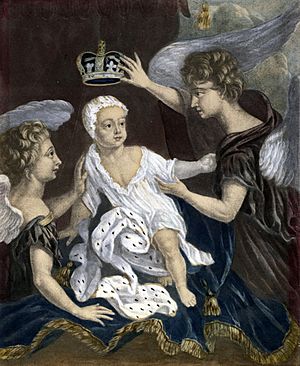
- Astraea Redux, 1660
- Annus Mirabilis (poem), 1667
- An Essay of Dramatick Poesie, 1668
- Absalom and Achitophel, 1681
- Mac Flecknoe, 1682
- The Medal, 1682
- Religio Laici, 1682
- To the Memory of Mr. Oldham, 1684
- Threnodia Augustalis, 1685
- The Hind and the Panther, 1687
- A Song for St. Cecilia's Day, 1687
- Britannia Rediviva, 1688, written to mark the birth of James, Prince of Wales.
- Epigram on Milton, 1688
- Creator Spirit, by whose aid, 1690. Translation of Rabanus Maurus' Veni Creator Spiritus
- The Works of Virgil, 1697
- Alexander's Feast, 1697
- Fables, Ancient and Modern, 1700
- Palamon and Arcite
- The Art of Satire
See also
 In Spanish: John Dryden para niños
In Spanish: John Dryden para niños


